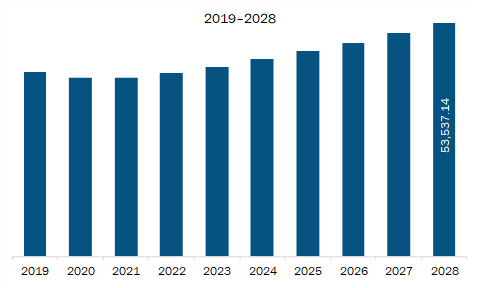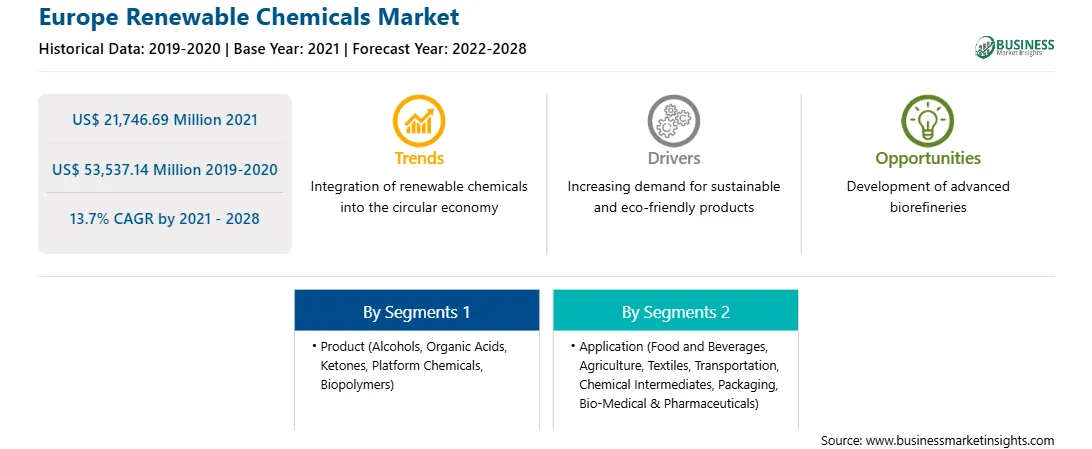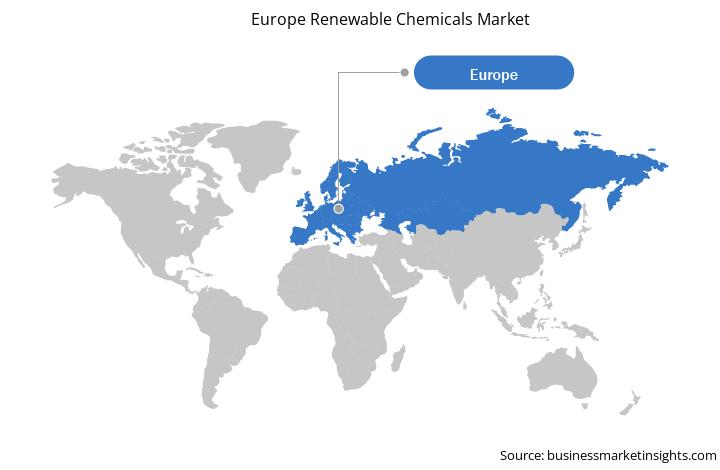The Europe renewable chemicals market is a highly fragmented market with the presence of considerable regional and local players providing numerous solutions for companies investing in the market arena. A significant surge in the demand for bio-based platform chemicals has been witnessed over the past few years owing to expanding application base across diverse industries coupled with increasing regulations related to conventional petroleum-derived chemicals, and the growing adoption of environment-friendly products. As the demand for eco-friendly products across industries gathers strength and companies focus on the development of effective varieties of bio-based platform chemicals, the renewable chemicals market is expected to grow at an impressive pace in the next few years. Additionally, the emergence of bio-refineries has provided a thrust in the development of bio-based platform chemicals as a significant substitute to petrochemicals. The use of bio-based platform chemicals holds strong potential for decarbonizing into novel products. Therefore, they find application in the production of plastics, car parts, and consumer products such as shoe soles. Several studies have been conducted to promote the use of platform chemicals over petrochemical chemicals. Several advances have been made to overcome a few potential challenges associated with limited production, complex synthesis mechanism, high costs, and the deactivation of catalysts. To overcome these challenges, researchers suggest the deployment of single-step catalytic conversions with the help of highly efficient and selective catalysts, exploring purification and separation technologies. Hence, rising adoption of bio-based platform chemicals is expected to promote the demand for renewable chemicals in Europe market.
In Europe, Russia reported a huge number of COVID-19 cases, which led to the discontinuation of several business operations, including renewable chemicals manufacturing activities. The significant decline in the growth of several industrial sectors negatively impacted the demand for renewable chemicals in the European market. The disruptions in terms of sourcing of raw materials from suppliers as well as temporary closures of manufacturing bases due to lockdowns and quarantines have impacted the growth of the market during the pandemic. Nevertheless, as the economies are planning to revive their operations, the demand for renewable chemicals is expected to rise in Europe. The expanding demand for renewable chemicals across food & beverages, agriculture, textiles, transportation, packaging, pharmaceuticals, and other industries, along with significant investment by prominent manufacturers, is expected to drive the growth for renewable chemicals.

Strategic insights for the Europe Renewable Chemicals provides data-driven analysis of the industry landscape, including current trends, key players, and regional nuances. These insights offer actionable recommendations, enabling readers to differentiate themselves from competitors by identifying untapped segments or developing unique value propositions. Leveraging data analytics, these insights help industry players anticipate the market shifts, whether investors, manufacturers, or other stakeholders. A future-oriented perspective is essential, helping stakeholders anticipate market shifts and position themselves for long-term success in this dynamic region. Ultimately, effective strategic insights empower readers to make informed decisions that drive profitability and achieve their business objectives within the market.

| Report Attribute | Details |
|---|---|
| Market size in 2021 | US$ 21,746.69 Million |
| Market Size by 2028 | US$ 53,537.14 Million |
| Global CAGR (2021 - 2028) | 13.7% |
| Historical Data | 2019-2020 |
| Forecast period | 2022-2028 |
| Segments Covered |
By Product
|
| Regions and Countries Covered | Europe
|
| Market leaders and key company profiles |
The geographic scope of the Europe Renewable Chemicals refers to the specific areas in which a business operates and competes. Understanding local distinctions, such as diverse consumer preferences (e.g., demand for specific plug types or battery backup durations), varying economic conditions, and regulatory environments, is crucial for tailoring strategies to specific markets. Businesses can expand their reach by identifying underserved areas or adapting their offerings to meet local demands. A clear market focus allows for more effective resource allocation, targeted marketing campaigns, and better positioning against local competitors, ultimately driving growth in those targeted areas.

The renewable chemicals market in Europe is expected to grow from US$ 21,746.69 million in 2021 to US$ 53,537.14 million by 2028; it is estimated to grow at a CAGR of 13.7% from 2021 to 2028. Renewable chemicals or bio-based chemicals are defined as those categories of chemicals, which are synthesized from renewable sources such as agricultural feedstock, agricultural waste, organic waste products, biomass, and microorganisms. Renewable chemicals are categorized as sustainable and environment-friendly chemicals which emits fewer carbon footprints as compared to traditional petro-based chemicals. Some of the most widely available renewable chemicals are lignin, carbohydrates, oils, plant extractives, hemicellulose, cellulose, starch, protein, and others. Such chemicals find application in diverse application bases such as food and beverage, agriculture, textiles, automotive, packaging and others. Renewable sciences have been regarded as one of the effective ways to promote the quality of air, water, and soil and contribute to sustainability by commercializing the use of eco-friendly bio-based chemicals in diverse applications. Eco-friendly sustainable renewable chemicals can be sourced from renewable feedstocks such as biomass, agricultural residues or feedstock, and microorganisms with the help of green chemistry synthesis or biorefineries. The chemicals have been identified as cost-competitive resources and portray potential for effective substitution of petrochemicals with renewable resources. Several nations are aiming to surpass the dependency on fossil-based resources. Also, the growing concern toward environmental degradation along with climate change propel the demand for renewable chemicals.
Based on product, the alcohols segment accounted for the largest share of the Europe renewable chemicals market in 2020. Based on application, the transportation segment accounted for the largest share of the Europe renewable chemicals market in 2020.
A few major primary and secondary sources referred to for preparing this report on the Europe renewable chemicals market are company websites, annual reports, financial reports, national government documents, and statistical database, among others. Major companies listed in the report include the Archer-Daniels-Midland Company (ADM); Cargill Incorporated; DSM; BASF SE.; Amyris Inc.; Evonik Industries AG.; Solvay; the Dow Chemical Company.; Genomatica, Inc. and Braskem SA.
The Europe Renewable Chemicals Market is valued at US$ 21,746.69 Million in 2021, it is projected to reach US$ 53,537.14 Million by 2028.
As per our report Europe Renewable Chemicals Market, the market size is valued at US$ 21,746.69 Million in 2021, projecting it to reach US$ 53,537.14 Million by 2028. This translates to a CAGR of approximately 13.7% during the forecast period.
The Europe Renewable Chemicals Market report typically cover these key segments-
The historic period, base year, and forecast period can vary slightly depending on the specific market research report. However, for the Europe Renewable Chemicals Market report:
The Europe Renewable Chemicals Market is populated by several key players, each contributing to its growth and innovation. Some of the major players include:
The Europe Renewable Chemicals Market report is valuable for diverse stakeholders, including:
Essentially, anyone involved in or considering involvement in the Europe Renewable Chemicals Market value chain can benefit from the information contained in a comprehensive market report.